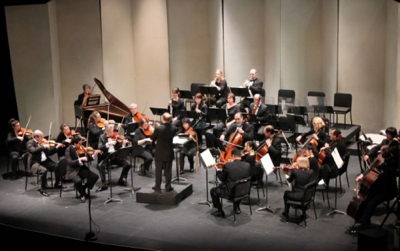Knoxville Symphony Chamber Orchestra–‘Orchestra Soloists’
Stamitz/Holzbogen: Trumpet Concerto in D
Mozart: Bassoon Concerto
R. Strauss: Le Bourgeois Gentilhomme
Sunday, Jan. 11, 2015, 2:30 p.m. Bijou Theatre
Tickets start at $15
(Continued from yesterday’s article)
Composer Richard Strauss and librettist Hugo von Hofmannsthal made a gigantic splash with their opera Der Rosenkavalier in 1911 and, wanting to use the momentum of a popular hit, immediately set about to create another. Hofmannsthal came up with the idea of a new work based upon the play Le Bourgeois Gentilhomme by Jean Baptiste Molière. However, Hofmannsthal’s scheme went even further, encompassing an entire evening of theatre and opera—first, his own German adaptation of Molière’s play, followed by an intermission and a short opera.
Strauss was unsure of the validity of the idea, but Hofmannsthal succeeded in convincing the composer that they might be creating something of a landmark in contemporary theatre. Strauss finished the music during the summer of 1911.
Unfortunately, the logistics of mounting such a production was probably its undoing. It is reported that there was significant hostility among performers (two casts) and the producers during its rehearsals in June of 1912. The premiere on October 25, 1912, did not go well, with Strauss later remarking: “The play-going public had no wish to listen to opera, and vice-versa.”
Four years later in 1916, Strauss and Hofmannsthal made adjustments to Ariadne auf Naxos, the operatic segment which was the conclusion of the 1912 Le Bourgeois Gentilhomme, adding a preface. It was performed in Vienna in October, 1916, as a standalone opera.
A year later, Hofmannsthal, not wanting the effort to go to waste, reworked the non-opera portion of the original Le Bourgeois Gentilhomme; Strauss revised and expanded the incidental music from the original. This revision, titled Der Bürger als Edelmann, was premiered on April 9, 1918 in Berlin, but received only lukewarm notices.
Strauss was apparently quite attached to the incidental music for the work. Not wishing to see the music languish in obscurity, he chose a suite of nine movements from Der Bürger als Edelmann, retained the chamber orchestra scoring, and had it performed on a New Year’s Day concert in Vienna in 1920. It is this suite, using the title of the French original, that we hear today as Le Bourgeois Gentilhomme. The suite seems to capture both the wit, charm, and sophistication of Molière and it remained one of Strauss’ personal favorites.








